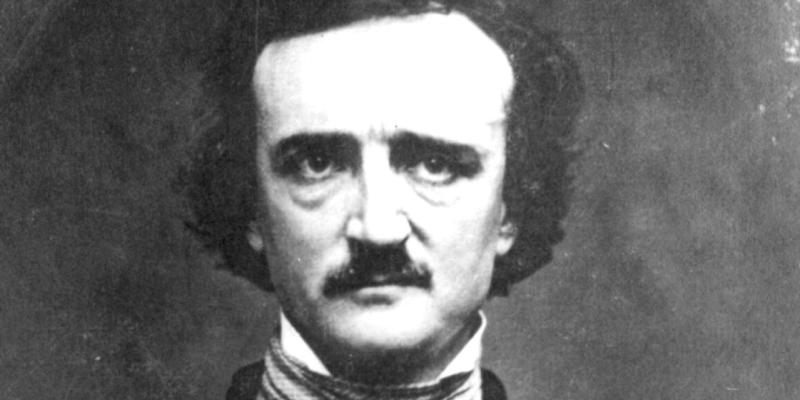'A Mystery of Mysteries' Review: Edgar Allan Poe, Through the Pale Door
By: William Tipper (WSJ)



On Oct. 9, 1849, the New-York Tribune published an unusually tart obituary. "Edgar Allan Poe is dead. He died in Baltimore the day before yesterday. This announcement will startle many, but few will be grieved by it."
That prediction—offered by a Tribune editor who had been slighted by Poe in print—might have been symptomatic of the dead man's facility for making enemies but was wildly wrong about the mourning to come. Not only did Poe at age 40 leave behind more than a few friends and admirers, over the century and a half since his death his reputation has only risen. As Mark Dawidziak notes in "A Mystery of Mysteries: The Death and Life of Edgar Allan Poe," few writers have achieved such enduring affection in the minds of generations of readers. Poe's ballad "The Raven" is still recited (and parodied), and tales like "The Cask of Amontillado" still produce genuine thrills. His doleful portrait can be found on T-shirts, coffee mugs and countless other knickknacks.
That’s to say nothing of his lasting impact on literature itself: “The Purloined Letter” created the template for the modern detective story, while other works pioneered horror, suspense and science fiction. And though it’s less remembered today, his literary criticism, in which Poe championed aesthetic standards over the back-patting and score-settling that characterized much American criticism at the time, was groundbreaking in its own right.
But there is no aspect of Poe’s brief life more infamous—or fascinating to his biographers—than its final hours. Mr. Dawidziak, a television and film critic who has written books on subjects ranging from Mark Twain to the TV series “Columbo,” has fashioned a book that is part high-speed tour of Poe’s tumultuous career and part cold-case investigation of his premature and enigmatic end.
Orphaned at 2, Edgar Poe was raised as a foster child by John and Frances Allan of Richmond, Va. (hence his middle name). His foster mother indulged his flair for the dramatic (“He’d stand on the dining room table in his stocking feet, toasting the ladies with sweetened wine,” writes Mr. Dawidziak). But his relationship with his foster father was never easy, and young Edgar found he could not find a comfortable place at home or in class-obsessed Richmond society. A sojourn at the University of Virginia (where he lapped up languages and gambled away his allowance) was followed by pursuit of an Army career at West Point, but he completed studies at neither.
In 1831 Poe moved in with his aunt in Baltimore and determined to make his living as a writer. He would work as an editor in Richmond before moving to New York and then to Philadelphia, where the next few years saw him publish enduring stories including “The Masque of the Red Death” and “The Black Cat.” In 1845 “The Raven” landed like a hit single: published nationally, it brought Poe, as Mr. Dawidziak writes, “a level of fame and recognition that must have been beyond gratifying.”
In contrast, his personal and business life was defined by chaos. Many of his reversals were self-inflicted: Friendships were regularly put under strain by requests for money or favors, and while Poe’s drinking didn’t interfere with his work, it regularly undid him socially (a binge wrecked his chances at a political appointment in the Tyler administration). Attacking the beloved Henry Wadsworth Longfellow as a plagiarist cost him the support of many in the New England literary world. The most punishing of his losses was the death of his wife, Virginia, at the age of 24.
As Mr. Dawidziak’s title itself suggests, the mysteries that crowd around Poe’s final days are multiple. On Oct. 3, 1849, Poe turned up—in Mr. Dawidziak’s phrase, “haggard, insensible, and unwashed”—at a Baltimore tavern doubling as a polling place. He was supposed to have been returning from a visit to Richmond to his home in Fordham, N.Y., where he had settled in 1846. He had left Richmond by steamboat after an evening with old friends—but though Mr. Dawidziak assiduously tracks his subject’s movements, he admits that once Poe boards the boat on Sept. 27 he is “completely shielded from our view” until he is found six days later.
A sympathetic passerby got from Poe the name of the Baltimore editor Joseph Snodgrass and summoned him to the scene. Snodgrass found his old colleague wearing shabby, secondhand clothes, writing later that “he had evidently been robbed of clothing, or cheated in an exchange.” Poe was delivered to Dr. John J. Moran at the Baltimore City and Marine Hospital. Though exactly what Poe said to Moran and others—and even the precise timeline of the ensuing days—is open to question, there is no uncertainty about how it ended: Poe died in his hospital bed on Sunday, Oct. 7.
“A Mystery of Mysteries” vigorously pursues the various causes of death that have been suggested over many years of speculation by scholars, forensic scientists and others. These include carbon monoxide poisoning from coal-gas lighting, mercury taken to treat cholera, heart disease, rabies, hypoglycemia and the damage left by alcoholism. Among the most intriguing scenarios that crops up: Poe’s arrival in Baltimore at the climax of an aggressively fought political campaign might have made him vulnerable to “cooping,” a form of 19th-century electoral fraud in which the unwary were snatched off the street, kept docile with booze and forced to vote repeatedly. The theory is dramatic and colorful—but it’s also, as the skeptical Mr. Dawidziak notes, circumstantial. Nor does it provide a cause of death.
Mr. Dawidziak’s approach has its shortcomings. He assembles a grand array of scholars, commentators, forensic scientists and Poe-obsessives, who are called in to offer expertise or simply opinion, and while this method has the benefit of introducing a panel of experts, the effect calls to mind a television documentary. The more we hear from this panel, the further the writer’s sensibility seems to recede. The nature of the threshold between life and death was an abiding subject of Poe’s thought, but we are here at some remove from its aura.
Though its author is careful to avoid pronouncing a verdict, “A Mystery of Mysteries” does, finally, point the way to a probable answer: tuberculosis, which likely killed both of Poe’s parents and Virginia Poe. If it’s true that he died from the disease that claimed about one in seven Americans of his time, the death of this extraordinary man was the most ordinary thing about him.






One of our finest authors:
Mr Edgar Allan Poe
American writer, poet, editor, and functioning alcoholic
The Book is:
A Mystery of Mysteries: The Death and Life of Edgar Allan Poe
By Mark Dawidziak
St. Martin's Press
288 pages
Poe was required reading in my high school and college English literature classes.
mine too
Although I majored in English Literature at university, did we ever study Poe? Nevermore.
Then I have to ask you what you think of the Yale English Department's ending the major English poets requirement?
I'd say it's just a part of the trend of America becoming more isolationist and self-centering.
AND...
Both Canada and America should consider the English authors and poets to be the history and background of their own writers and writings. But then American history does seem to be getting its weeding as well, eh? By the way, Hemingway was a part of my English Lit. major studies. I assume only rare attention was paid in American universities to Canadian authors and poets (except maybe these days Margaret Atwood whose prescience was amazing). Besides being a composer and folksinger, Leonard Cohen was also an author and poet whom I assume some Americans are familiar with, but most likely just with his music.